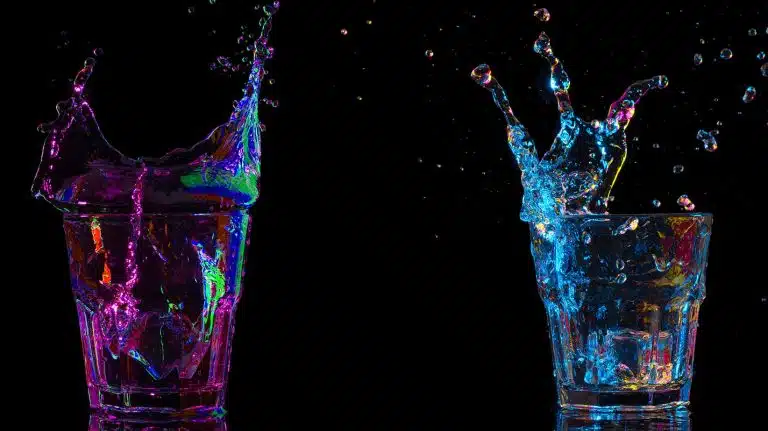LSD can be risky to take on its own. When mixed with alcohol, it can be even more unpredictable and dangerous.
It’s not recommended to take the two substances together because of the unpredictability of LSD and the negative effects the mixture can cause.
Effects Of LSD
Lysergic acid diethylamide (LSD), or acid, is a psychedelic drug and hallucinogen that likely puts the person using it in an altered state.
LSD works by binding itself to certain serotonin receptors in the brain and changes the activity of neural pathways. These changes are what alter perceptions and create hallucinations.
LSD is available in a liquid form on sheets of absorbent paper that are ingested. The effects begin 30-60 minutes after ingestion and can last about 6-12 hours.
The effects of LSD may include:
- hallucinations (auditory and visual)
- distortion of time
- rapid heart rate
- fever
- high blood pressure
- dilated pupils
- profuse sweating
- loss of appetite
- sleeplessness
- dry mouth
- tremors
Alcohol & A “Bad Trip”
When you take LSD with a depressant like alcohol, a depressant, the unpredictability of the effects can be harmful.
A “bad trip” can become even worse when alcohol is added. Additionally, LSD can cause people to not feel the effects of alcohol as intensely. That can easily cause someone to drink more alcohol and ultimately experience alcohol poisoning.
Effects Of Mixing LSD & Alcohol
People likely mix LSD and alcohol together for lots of reasons, including to feel a more intense euphoria or to fight against the effects of the other substance.
The effects of mixing LSD and alcohol may include:
- hallucinations (visual and auditory)
- insomnia
- appetite changes
- vomiting
- nausea
- unpredictable trips
- loss of time
- restlessness
- insomnia
- dilated pupils
- dehydration
- changes in blood pressure
- rapid heart rate
- impaired coordination and cognitive function
- blackouts
If you experience any of these side effects, it’s important to see your healthcare provider or seek emergency help as soon as possible.
Risk Of Mixing Alcohol & LSD
As with any substance, how you react to polysubstance abuse depends on a number of factors including:
- dosage/level of alcohol consumption
- whether you’ve eaten
- body size and composition
- what medications you’ve taken
- past physical and mental health
- tolerance to LSD or alcohol
Depending on the above factors, mixing alcohol and LSD may increase the risk of serious health issues.
Increased Risk Of Alcohol Poisoning
Because LSD can reduce the intoxicating effects of alcohol, it can lead to someone drinking more to feel the effects they want. This can increase the risk of alcohol poisoning or overdose.
Additionally, because alcohol can cause a lack of judgment and self-control, it can lead to taking more LSD than you normally would.
Addiction
Although there is little evidence that suggests LSD is addictive, frequent substance use can lead to physical dependence and tolerance.
As your tolerance to each substance increases, you’ll likely need more of it to feel the desired effects. Together, alcohol and LSD can lead to a substance use disorder and make it feel impossible to quit.
Unpredictability
The unpredictability of LSD, whether it’s used on its own or mixed with alcohol, is one of the most dangerous risks of this drug.
Some people feel like alcohol dulls the effects of LSD while others experience the opposite. It’s impossible to know how each person will respond to it.
People can also be reckless or harm themselves or others when mixing LSD and alcohol. Both substances lead to an increase in impulsiveness which can increase the risk of life-threatening accidents.
Treatment For Polysubstance Abuse
When in addiction treatment for drug or alcohol abuse, detox programs, inpatient care, and outpatient services are all likely available.
In these programs for substance use or alcohol use disorders, people receive therapy, participate in support groups, go through withdrawal in a safe environment, and learn coping skills to help with relapse prevention.
If you or a loved one struggles with drug abuse or alcohol addiction, please call our helpline to discover the right treatment options for you.
Written by Ark Behavioral Health Editorial Team
©2024 Ark National Holdings, LLC. | All Rights Reserved.
This page does not provide medical advice.
Drug Enforcement Administration (DEA) - LSD
National Institute on Drug Abuse - Hallucinogens Drug Facts
National Library of Medicine: MedlinePlus - Substance use - LSD
National Library of Medicine: StatPearls - Lysergic Acid Diethylamide Toxicity

Questions About Treatment?
Ark Behavioral Health offers 100% confidential substance abuse assessment and treatment placement tailored to your individual needs. Achieve long-term recovery.
100% confidential. We respect your privacy.
Prefer Texting?
Our friendly support team is here to chat 24/7. Opt out any time.








 Learn More
Learn More








